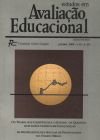Alocação do tempo para estudo e desempenho no vestibular: evidências a partir da Universidade Federal da Bahia
DOI:
https://doi.org/10.18222/eae153020042154Keywords:
Vestibular, Tempo Para Estudo, Produção Educacional, Oportunidades Educacionais, Desigualdade De Renda, Estrutura De Classes SociaisAbstract
Este artigo desenvolve um modelo teórico acerca do comportamento do vestibulando e um modelo empírico de função de produção educacional. A hipótese básica do artigo, e que se confirma empiricamente, é a de que o indivíduo realiza uma auto-seleção ao escolher o curso para o qual se candidata. Os indivíduos pobres, ou seja, aqueles que têm escassez de tempo para estudar porque trabalham, selecionam os cursos menos concorridos de modo a aumentar as suas chances de ingressar no ensino superior. Uma vez que a concorrência é maior quanto maior for a renda vitalícia promovida pela profissão escolhida, o indivíduo mais pobre perpetua a sua condição de pobreza ao tender a escolher o curso menos concorrido. Isto demonstra a discriminação do vestibular contra os pobres, configurando-se em um mecanismo de seleção bastante injusto socialmente e que promove ainda mais a desigualdade social já tão grande no País.Downloads
Downloads
Published
How to Cite
Issue
Section
License
Authors who publish in this journal agree to the following terms:
a. Authors retain the copyright and grant the journal the right to first publication, with the paper simultaneously licensed under the Creative Commons Attribution license that allows the sharing of the paper with acknowledgment of authorship and initial publication in this journal.
b. Authors are authorized to assume additional contracts separately, for non-exclusive distribution of the version of the paper published in this journal (for example publishing in institutional repository or as a book chapter), with acknowledgment of authorship and initial publication in this journal.
c. Authors are allowed and encouraged to publish and distribute their paper on-line (for example in institutional repositories or on their personal page) at any moment before or during the editorial process, as this can generate productive changes, as well as increase the impact and citation of the published paper (See The Effect of Open Access).





